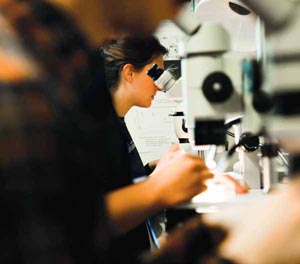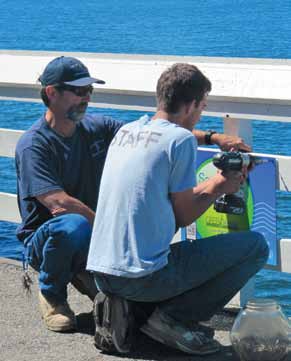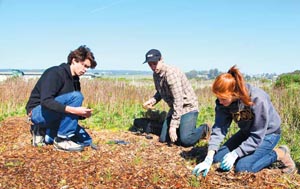Campus News
Working hand in hand
Every year, hundreds of UCSC student interns and volunteers do important work in the community that surrounds them.




An unsettling tremble runs through the Santa Cruz Wharf as a large truck passes, but UC Santa Cruz students Shyyon Kishani, 20, and Kevin Dang, 21, don’t even flinch.
That’s because Kishani, a junior physical science student from College Eight, and Dang, a senior economics and environmental studies major from College Nine, have spent a lot of time on the wharf. In fact, they’ve been tasked with figuring out alternate ways to get rid of waste and used cooking grease from the wharf without using heavy vehicles like the one rumbling past, which can cause damage to the 99-year-old structure.
Their efforts for the city—part of an environmental studies internship—is just one example of the way UCSC students are reaching out to work in the community that surrounds them.
Over the past four quarters, for example, nearly 700 UCSC environmental studies interns have contributed close to 60,000 hours of work to nonprofits, businesses, and government in the Santa Cruz area. That number doesn’t include the numerous students who have given hours and made donations to nonprofits like Habitat for Humanity and Second Harvest Food Bank through the campus’s Student Volunteer Center or participated in other internship programs offered through different divisions.
“UCSC is a real powerhouse in terms of cognitive resources,” says Santa Cruz Wharf Manager Jon Bombaci (College Eight ’94, environmental studies) as he stands near a display for an innovative eco-tour led by another UCSC student. “It makes great sense to me to bring that to bear on the community.”
Chris Krohn, UCSC’s environmental studies internship coordinator, is driving his battered, green van to visit sites where students are doing solar-energy audits for a company called Allterra and getting ready to build bike generators and install solar tubes at the Natural Bridges Green Careers Center alternative school.
Hands on the wheel, he reflects on the beneficial relationship between students and the community. Not only do local agencies and businesses get the enthusiasm and brain power of UCSC students, he says, but the program’s young men and women get an edge when it comes to landing a job.
“Their resume becomes filled, not with coffee shop and waitress jobs,” says Krohn (Merrill ’87, community studies), “but with National Oceanic and Atmospheric Administration, California Certified Organic Farmers, California State Parks, Monterey Bay Aquarium, and California Coastal Commission positions.”
Nowhere is that more evident than in a narrow lab at the NOAA Fisheries Ecology Division, where four UCSC students hunch over microscopes under the watchful eye of Cynthia Kern, a research biologist with the National Marine Fisheries Service.
The students are plucking caddisflies, mayflies, and other insects out of hundreds of water samples taken after the devastating 2009 Lockheed Martin fire in the Santa Cruz Mountains. Part of a study looking at the effects of fire on salmon populations, their work is invaluable as far as getting research done in a timely fashion, Kern says.
For Sebastian Krause (College Eight ’14, marine biology), the work is another step along his career path.
“I’ve always wanted to be a discoverer,” he says, “and this is an extension of that.”
From replanting an old Brussels sprouts field with native species at UCSC’s Younger Lagoon Reserve, to comparing the price of supermarket produce with farmers’ market veggies, UCSC students are making a difference not only in their own lives but also in the lives of others.
Marissa Kotila, co-owner of Casalegno Family Farm near Soquel, remembers one of the four interns who worked with them.
Deciding to grow their own heirloom tomato seedlings and being unable to finish a new greenhouse in time, the family put the fragile sprouts in the attic of their house. Each day, their UCSC intern would climb into the rafters and painstakingly hand-water every plant.
Says Kotila, “We harvested a beautiful crop of tomatoes that year.”
Peggy Townsend is a freelance writer based in Santa Cruz.